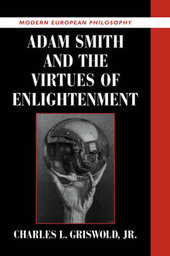
|
Adam Smith and the Virtues of Enlightenment
Hardback
Main Details
| Title |
Adam Smith and the Virtues of Enlightenment
|
| Authors and Contributors |
By (author) Charles L. Griswold, Jr
|
| Series | Modern European Philosophy |
|---|
| Physical Properties |
| Format:Hardback | | Pages:428 | | Dimensions(mm): Height 237,Width 161 |
|
| Category/Genre | Western philosophy - c 1600 to c 1900 |
|---|
| ISBN/Barcode |
9780521621274
|
| Classifications | Dewey:192 |
|---|
| Audience | | Professional & Vocational | | Tertiary Education (US: College) | |
|---|
|
Publishing Details |
| Publisher |
Cambridge University Press
|
| Imprint |
Cambridge University Press
|
| Publication Date |
13 November 1998 |
| Publication Country |
United Kingdom
|
Description
Although Adam Smith is often thought of today as an economist, he was in fact (as his great contemporaries Hume, Burke, Kant, and Hegel recognized) an original and insightful thinker whose work covers an immense territory including moral philosophy, political economy, rhetorical theory, aesthetics, and jurisprudence. Charles Griswold has written the first comprehensive philosophical study of Smith's moral and political thought. Griswold sets Smith's work in the context of the continuing debate about the nature and survival of the Enlightenment, and relates it to current discussions in moral and political philosophy. Smith's appropriation as well as criticism of ancient philosophy, and his carefully balanced defense of a liberal and humane moral and political outlook, are also explored. This is a major reassessment of a key figure in modernity that will be of particular interest to philosophers and political and legal theorists, as well as historians of ideas, rhetoric, and political economy.
Reviews'Griswold's arguments are deep, far-reaching and all the more effective for the many interesting examples, drawn from recent events and biographical accounts. He sets a paradigm before us, in which one person injures another, seeks forgiveness and then receives it ... Griswold tells us much about forgiveness, about the mental processes involved in it, and the way in which interpersonal relations are shaped by it.' Roger Scruton, Times Literary Supplement 'In a rich and detailed examination of The Theory of Moral Sentiments Griswold presents Smith as a rhetorically sophisticated dialectical thinker, defending Enlightenment values while aware of their profound costs, seeking a philosophical system while distrustful of the system, and aiming to guard ordinary moral life against excessive reflection. This is a major study, resting on a thorough rethinking of all of smith's work. Griswold shows Smith to be a more complex moral thinker than he has been taken to be, and one far more pertinent to current issues.' Jerome B. Schneewind, John Hopkins University 'With one eye on the eighteenth century and the other on our current predicament, Charles Griswold's Adam Smith and the Virtues of Enlightenment is wonderfully interesting and informative, philosophically stimulating and acute, and beautifully written.' Stephen Darwall, University of Michigan, Ann Arbor '... exemplary in spelling out many of Smith's arguments and subjecting them to analytic scrutiny. If reading it required effort, the reward is substantial.' Wall Street Journal
|